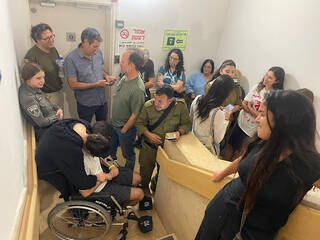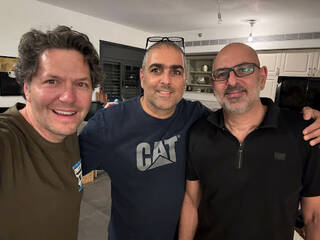During our time living in Palo Alto we became close to the Maor family. Two of their four children, Gefen and Yuval, were in the same grades as our kids. Their older sons were students in my Pirkei Avot class.
They moved back to Israel a year after we made aliya in 2009 which allowed us to reconnect and deepen our friendship. I had the honor of officiating at Gefen’s bat mitzvah in Israel and, just last year, at their son Amit’s wedding in California.
A few weeks ago, I got word that their youngest daughter Yuval’s boyfriend, Shachar (not his real name as he is still serving in a combat unit), had been badly wounded on October 7.
I had the chance to visit him the other evening in a special ward of the Tel HaShomer hospital for those who have been injured in the war. When I approached the entrance to the building, I was delighted to see the Maor family sitting outside with Shachar. He was sitting up in a wheelchair, smiling, and looking quite well, especially in comparison to the photos I had seen of him in the ICU immediately after his injury.
I sat with Shachar and the family for some time and heard the harrowing story of his bravery and near-death – a story Hollywood might reject for seeming too far-fetched, only it was his reality.
His unit, an elite one, was among the first to arrive at the Otef Aza (the Gaza Envelope, which refers to the area nearest Gaza) on October 7. Beginning at the site of the Nova Festival, continuing on the area’s main roads, and eventually arriving at the kibbutzim, he and the other members of his unit fought for over 12 hours against more than 2,000 Hamas terrorists.
Toward nightfall, Shachar reached Kibbutz Be’eri, where hundreds of terrorists were still on a killing spree. Shacher and another soldier, risking their lives, came upon nine Hamas terrorists wearing IDF uniforms. The terrorists opened fire, killing Shachar’s partner instantly. Shachar was hit by three bullets. He somehow managed to crawl to safety and find a protected space. He was able to staunch his wounds until, thankfully, another unit of IDF soldiers soon arrived. Eventually, the terrorists were eliminated, and the IDF brought Shachar to safety using a commandeered kibbutz golf cart.
Just as Shachar finished telling his story, an air-raid siren went off. We all moved quickly inside the building and congregated in a stairwell for safety. It was a powerful reminder of what Shachar and his fellow soldiers – as well as everyday Israelis – have been risking their lives for: l’hiyot am hofshi b’artzeinu – to be a free people in our own land, to live in peace and not in fear.
Later that same evening, I joined my cousins Eli and Yehudah for dinner. Two of Yehudah’s sons have been called up for reserve duty, one the south and one in the north. One of Eli’s sons was also called up and is serving as well.
They told me that somewhere between 150-180% of those called up have reported. That means that essentially everyone who was called up showed up, plus tens of thousands more who weren’t called up at all. This includes – for the first time in history – 2500 ultra-Orthodox Israelis, and planes full of Israelis returning home to serve, even those not officially called up.
What gives me strength and hope during this challenging time is the courage, dedication, and commitment I see in our soldiers and in all those who support them. Shachar’s bravery saved the lives of dozens of people on October 7 – he nearly gave his own life in the process. My cousins, Itay, Ori, and Yuval, dropped everything, grabbed whatever gear they had, and reported immediately for duty – as did tens of thousands of their fellow Israelis.

Taking shelter in a stairwell of the Tel HaShomer hospital during a “Red Alert”

Rabbi Yoshi and his cousins, Eli and Yehuda
What gives me strength and hope is the resilience – the extraordinary resilience – of our people. We continue to experience more than our fair share of trauma and pain, and yet we somehow find the determination to carry on without abandoning our values, our humanity, or our capacity to feel empathy for the other, even for our enemies. Again and again during my visit, Israelis talked about the need to rescue the hostages in a way that would cause the fewest civilian casualties in Gaza.
What gives me strength and hope is our capacity to love. Despite our differences and disagreements, moments like these remind us powerfully of our shared past and our common destiny. In good times and in difficult ones as well, we have one another to hold onto, to support, to grieve with, and to remind each other that somehow, someway, the words “Am Yisrael Chai” will continue to ring true.
Shabbat Shalom—
Rabbi Yoshi Zweiback
